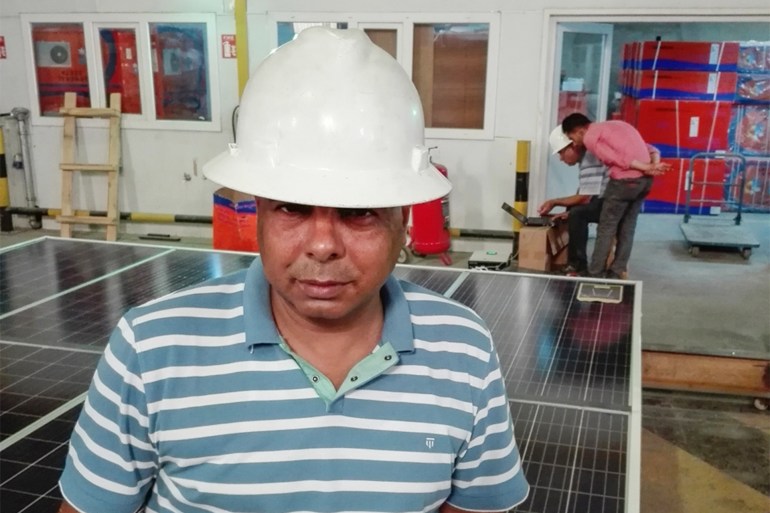Anbar-
With the continuation of the electric power crisis that Iraq has witnessed for years, consulting engineer Adel Hassan Mahmoud decided to work on the production of alternative renewable energy by manufacturing solar panels to generate electricity and provide it to his home, in the western province of Anbar.
Mahmoud managed with his own efforts to achieve success for his project, and he aspires to support this project to be productive for everyone, especially since all natural means are available, he said. to climate change.
persistent need
Speaking to Al Jazeera Net, Mahmoud, 56, who has a doctorate in electrical power engineering, says that he decided to implement this idea in 2016 after the end of the battles that took place in the city of Ramadi and their return from displacement, as he suffered from the lack of electrical energy and was relying only on private private generators. .
He added that he met with a number of his engineering friends and took it upon themselves to rely on solar energy to generate electricity for homes, so that his house became the first house in Anbar Governorate that relies on solar energy completely, to realize the idea that he had been working on since he was a student in electrical engineering.
Adel Mahmoud aspires to support and expand his project to be productive for all (Al Jazeera)
Project development
According to Mahmoud, the project consists of parts, the most important of which are the solar panels, batteries, the charging regulator and the inverter, and all parts of the system are currently available in the market after they were scarce.
He shows that his project expanded and decided to open an office in the name of Al Shams Technical Office for solar energy systems, and they completed many projects for homes and agricultural projects, and it has an economic feasibility better than the costs of generator wages, as well as the environmental aspect, and this is important "because it concerns the future of Iraq as it reduces carbon dioxide emissions And if Iraq relied entirely on renewable energy, our climate would change for the better, and global warming would decrease."
Mahmoud noted that he trained in Germany with the German Fleon Company, and then trained the engineering and technical staff.
Regarding the cost of the project, he stressed that the cost is medium, and in the event of obtaining support, it is possible to produce solar panels, because they are the most important part, especially for Iraq’s possession of silicate material with a purity of 97%.
Mahmoud expressed his hope to see Iraqi homes rely on solar energy, stressing his relentless pursuit of developing this project.
Project Feasibility
In turn, Engineer Hassan Abdul Majeed Al-Hiti, advisor to the Governor of Anbar for energy affairs, believes that Iraq needs such projects, because they do not require high costs in maintenance and operation, as well as the availability of large and cumbersome fuel costs.
In his interview with Al-Jazeera Net, Al-Hiti suggested the success of such projects despite the cost of purchasing and installing them, because the desired production capacity is much less than the design capacity, and Anbar desperately needs it due to the lack of sufficient production stations within the province's territory.
The governor’s advisor estimates that the current stations’ production rate does not exceed 15% of the total energy need in the governorate, and during the next 5 years it will continue to depend on the neighboring governorates and the central government to provide energy.
Regarding the economic feasibility, he says, "We will abandon the civil generators. As for the scientific ones, this field is new to Iraq and the Iraqis, despite its spread in all the neighboring countries that have oil and gas, and for this the new generation will learn all the developments in science in this field, and it is It will take a lot of work."
Al-Hiti revealed that large projects are being worked on in this field, which were referred during this year with the aim of producing 7500 megawatts. The Iraqi Council of Ministers recommended all ministries and governorates to facilitate the procedures for providing 10,000 megawatts during the next year.
Pilot projects
For his part, the Director of the Renewable Energy Research Center at the University of Anbar, Engineer Wissam Hashem Khalil, talks about the existence of other projects similar to this project, as he supervised the design of up to 7 solar energy systems at the university as part of the projects of graduate students.
And he indicated to Al Jazeera Net that the project conforms to quality specifications, as approved international design programs have been adopted with regard to solar energy systems that convert solar radiation into electric current.
The Director of the Research Center prefers that these projects be expandable in the future, and add new panels, batteries and transformers.
Khalil pointed out that the rates of solar radiation throughout Iraq are very high, and Anbar also enjoys high solar brightness, and for long periods of time, as conditions are favorable for such projects in Iraq, with the need to keep the panels clean from dust.
Regarding the future outlook of the project, Khalil says: “Like it or not, we will one day turn to solar energy, so it is better to enter this system early to develop these projects, and to get rid of the environmental pollution caused by the huge number of generators that run on fossil fuels and carbon dioxide emissions that pollute the environment.” It casts a shadow over the crumbling health system in Iraq."

